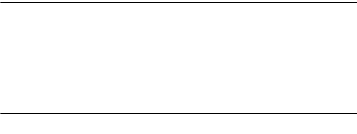
4
Safety information
protection against such interference is ensured,
although there is no guarantee this will not occur
in a given installation. If interference is suspected
and verified by switching this equipment on and
off, the user is encouraged to try to correct the
interference by one or more of the following
measures: Reorient the radio/television
receiver’s antenna, relocate the equipment with
respect to the receiver, plug the equipment and
receiver into separate circuit outlets. The user
may also wish to consult a qualified radio/
television technician for additional suggestions.
This equipment has been fully tested and
complies with all limits for Class B computing
devices pursuant to part 15 FCC Rules and
Regulations. This device complies with RSS-210
of Industry Canada. Operation is subject to the
following two conditions: (1) This device may not
cause interference, and (2) This device must
accept any interference, including interference
that may cause undesired operation of the device.
This device complies with Part 15 of the FCC
Rules. Operation is subject to the following two
conditions:
(1) This device may not cause harmful
interference; and (2) This device must accept any
interference received, including interference that
may cause undesired operation.
This equipment has been tested and found to
comply with the limits for a Class B digital device,
pursuant to Part 15 of the FCC Rules. These
limits are designed to provide reasonable
protection against harmful interference in a
residential installation.
This equipment generates, uses, and can radiate
radio frequency energy and, if not installed and
used in accordance with the instructions, may
cause harmful interference to radio
communications. However, there is no guarantee
that interference will not occur in a particular
installation.
Privacy of Communications may not be ensured
when using this product.
If this equipment does cause harmful interference to
radio or television reception, which can be
determined by turning the equipment off and on, the
user is encouraged to try to correct the interference
by one or more of the following measures:
• Reorient or relocate the receiving antenna
(that is, the antenna for radio or television that
is “receiving” the interference).
• Reorient or relocate and increase the
separation between the telecommunications
equipment and receiving antenna.
• Connect the telecommunications equipment
into an outlet on a circuit different from that to
which the receiving antenna is connected.
If these measures do not eliminate the
interference, please consult your dealer or an
experienced radio/television technician for
additional suggestions. Also, the Federal
Communications Commission has prepared a
helpful booklet, “How To Identify and Resolve
Radio/TV Interference Problems.” This booklet is
available from the U.S. Government Printing
Office, Washington, D.C. 20402. Please specify
stock number 004-000-00345-4 when ordering
copies.
Notice: The changes or modifications not
expressly approved by the party responsible for
compliance could void the user's authority to
operate the equipment.
1.3 Hearing Aid Compatibility (HAC)
This telephone system meets FCC/Industry
Canada standards for Hearing Aid Compatibility.
1.4 FCC RF Radiation Exposure
Statement
This equipment complies with FCC RF radiation
exposure limits set forth for an uncontrolled
environment. This equipment should be installed
and operated with a minimum distance of 20
centimeters between the radiator and your body.
This transmitter must not be co-located or
operated in conjunction with any other antenna
or transmitter.
For body worn operation, this phone has been
tested and meets the FCC RF exposure
guidelines when used with the belt clip supplied
with this product. Use of other accessories may
not ensure compliance with FCC RF exposure
guidelines.


















